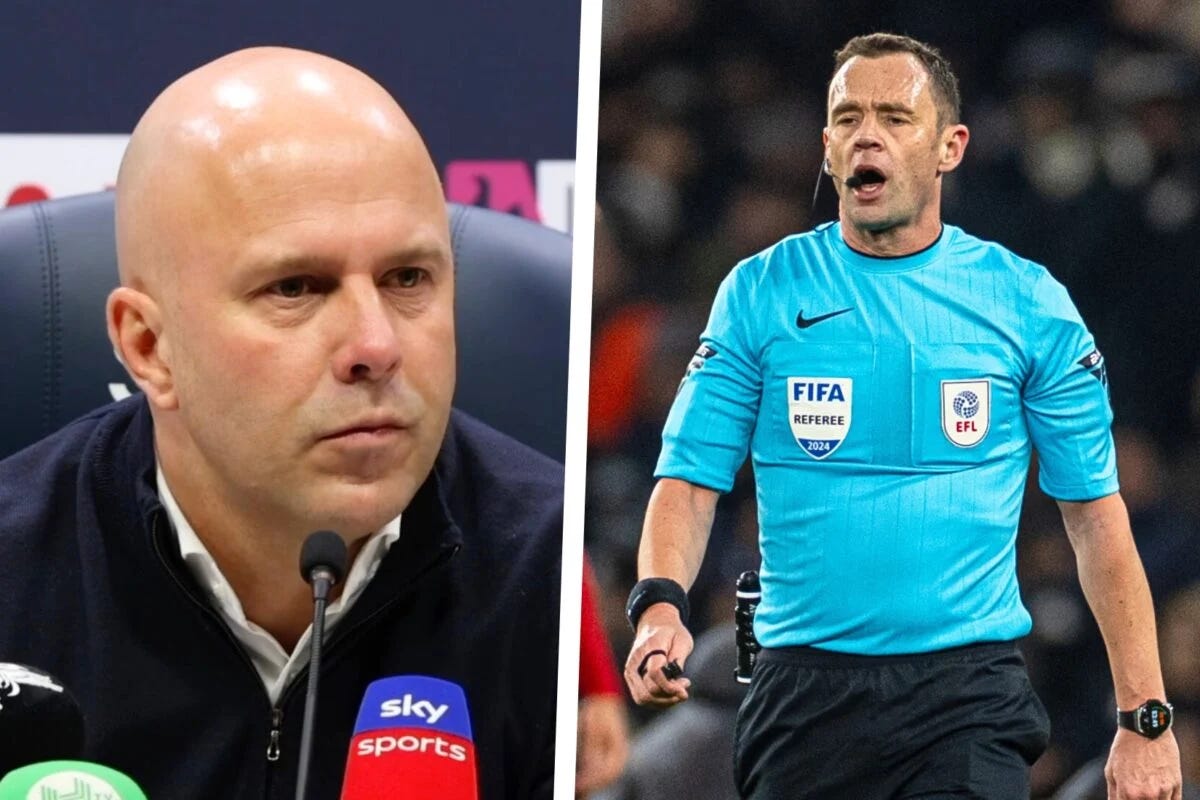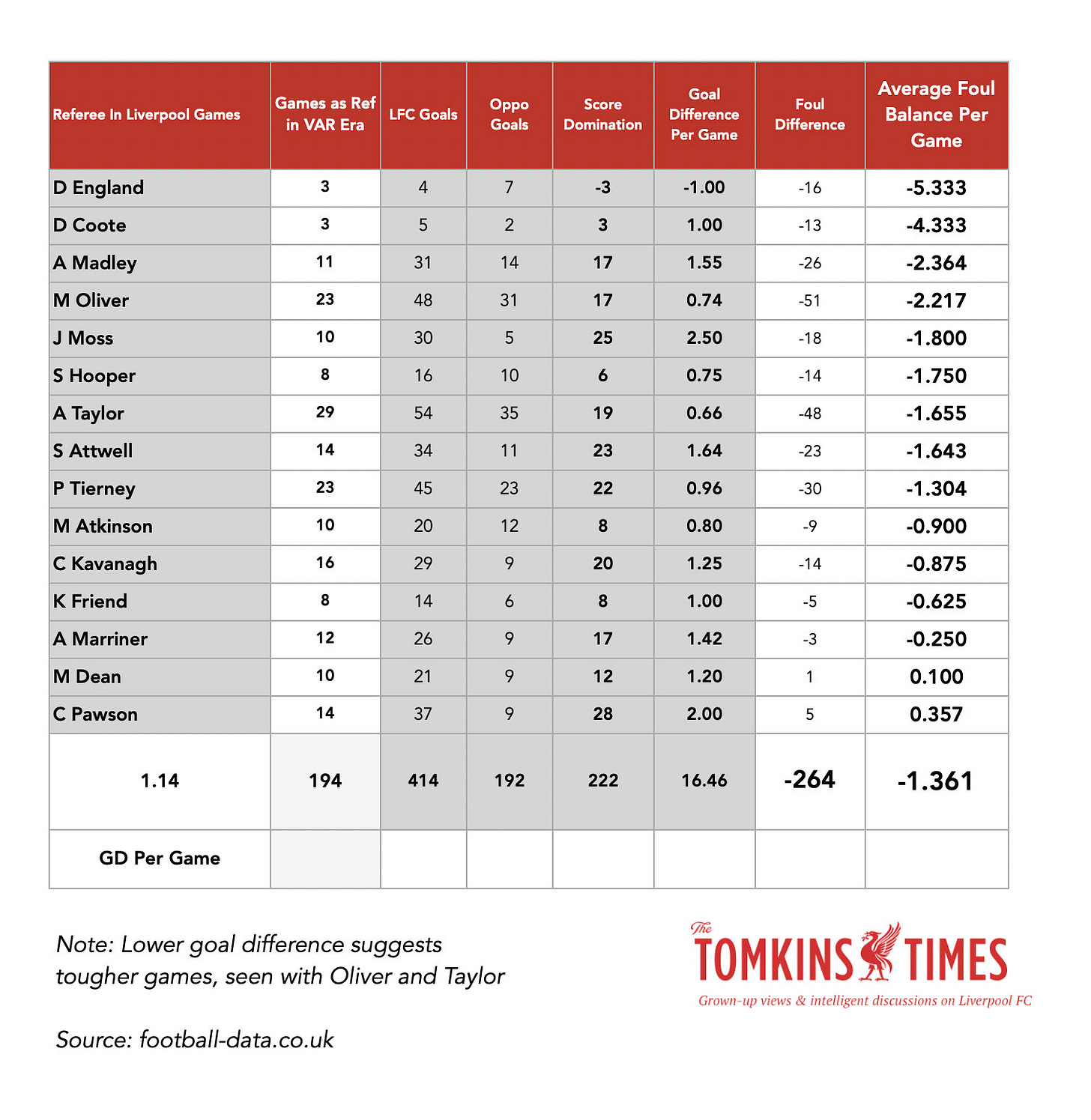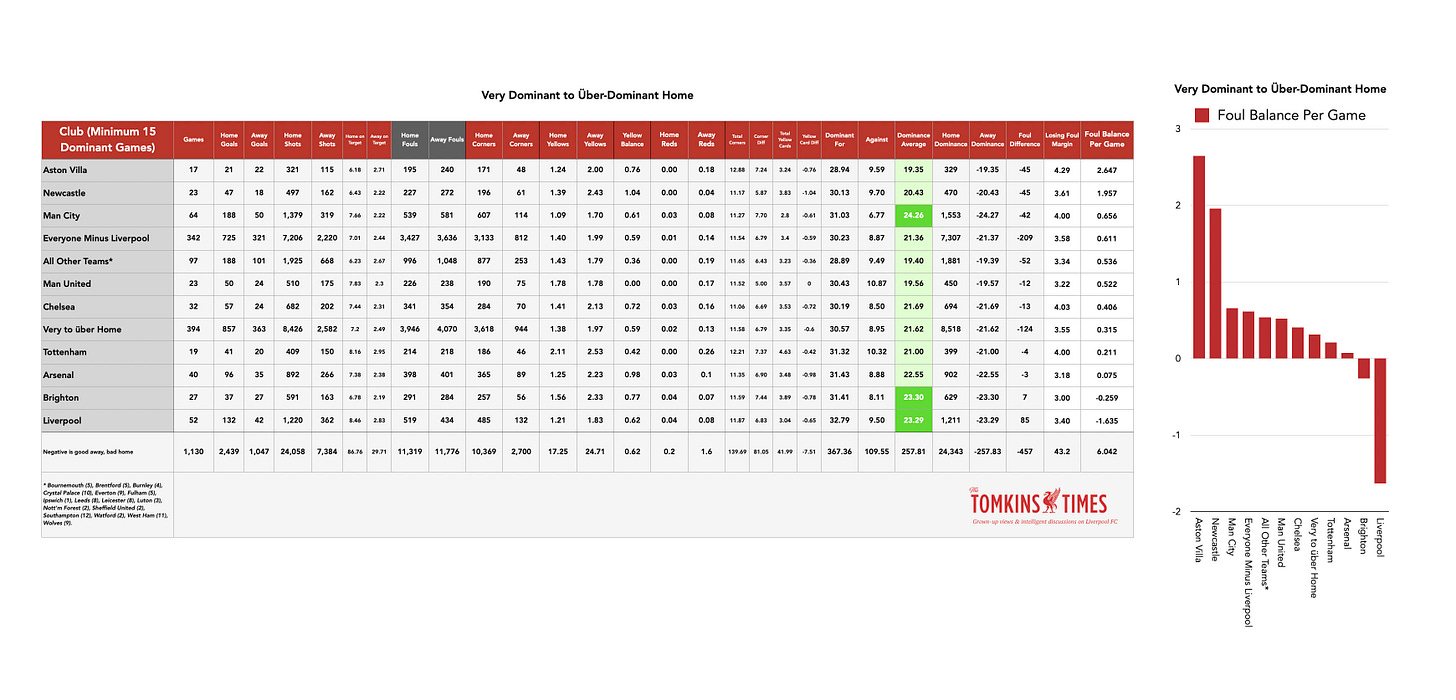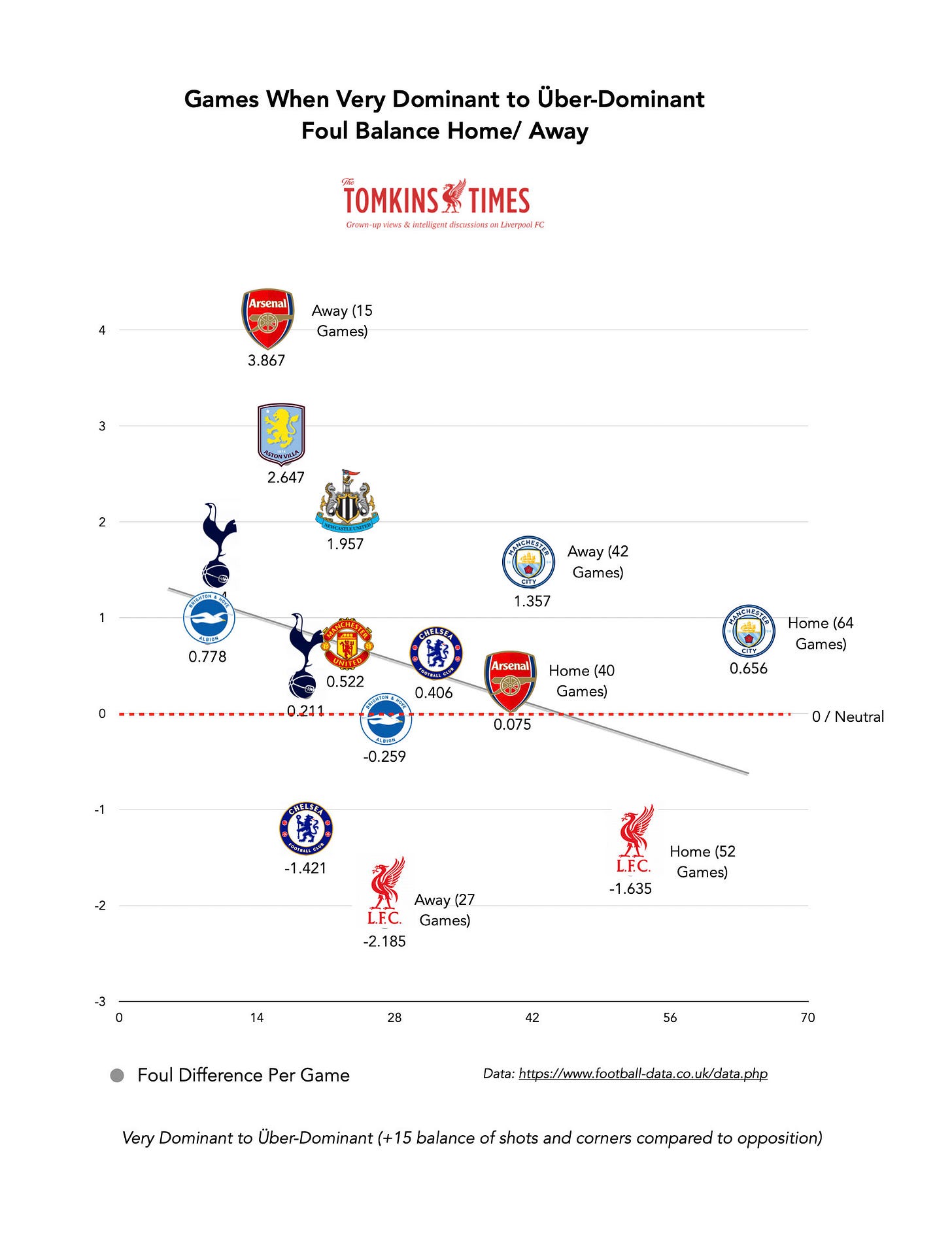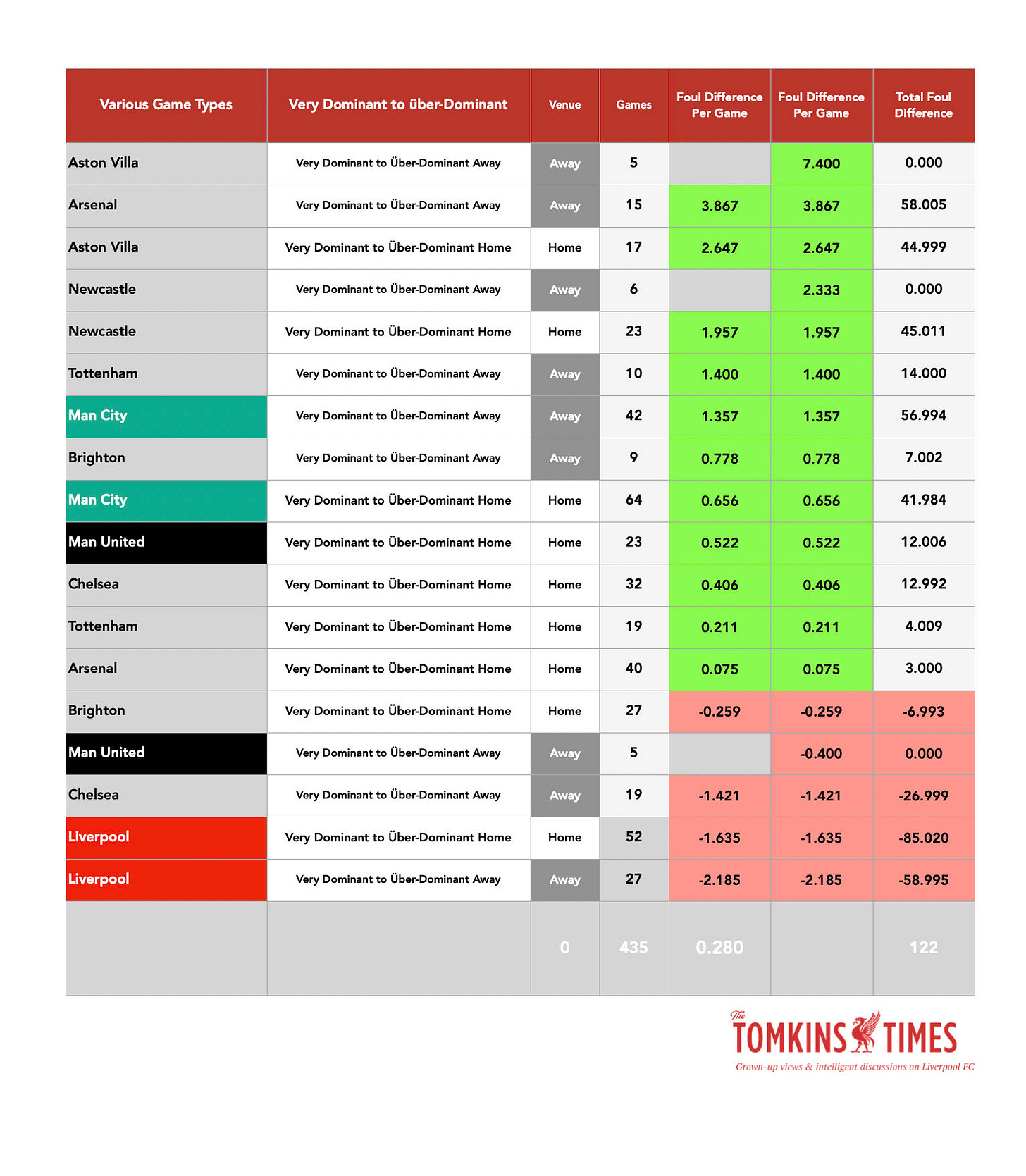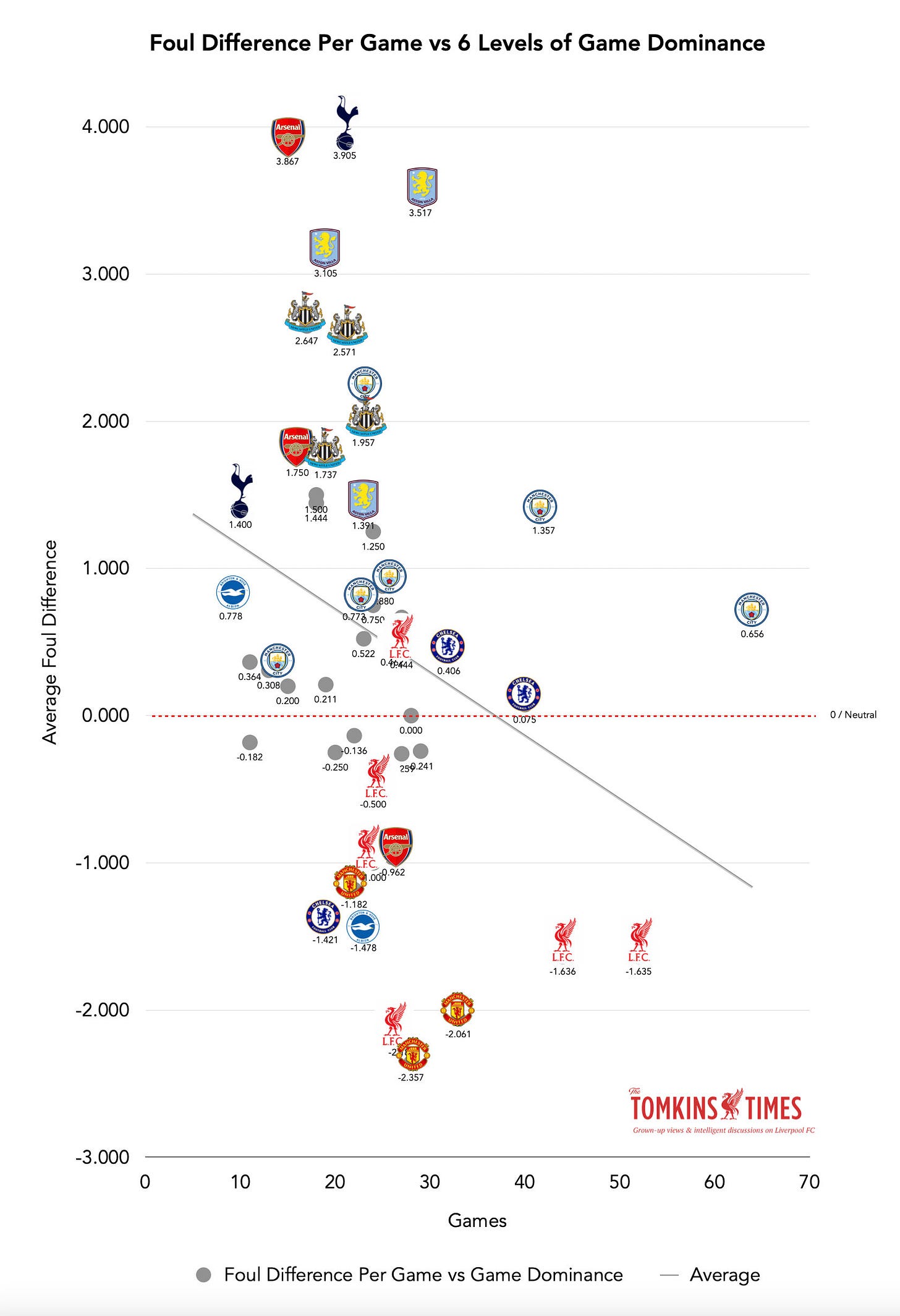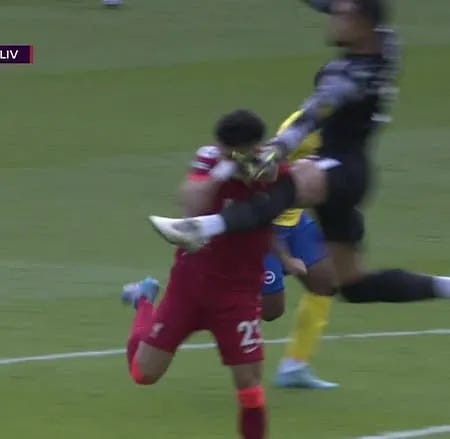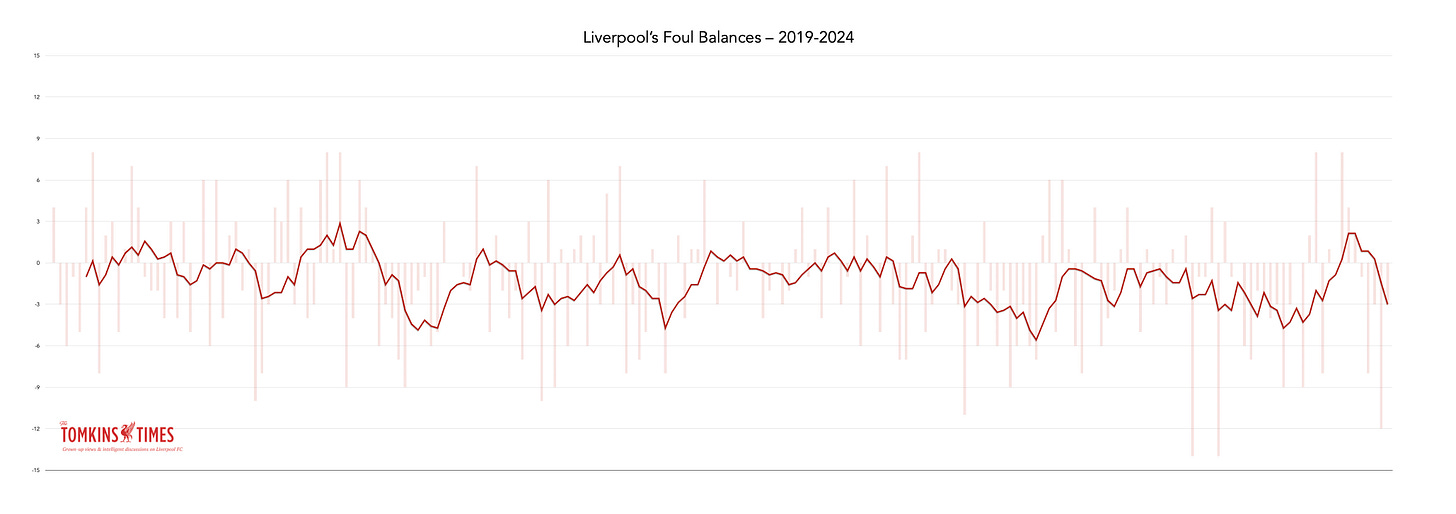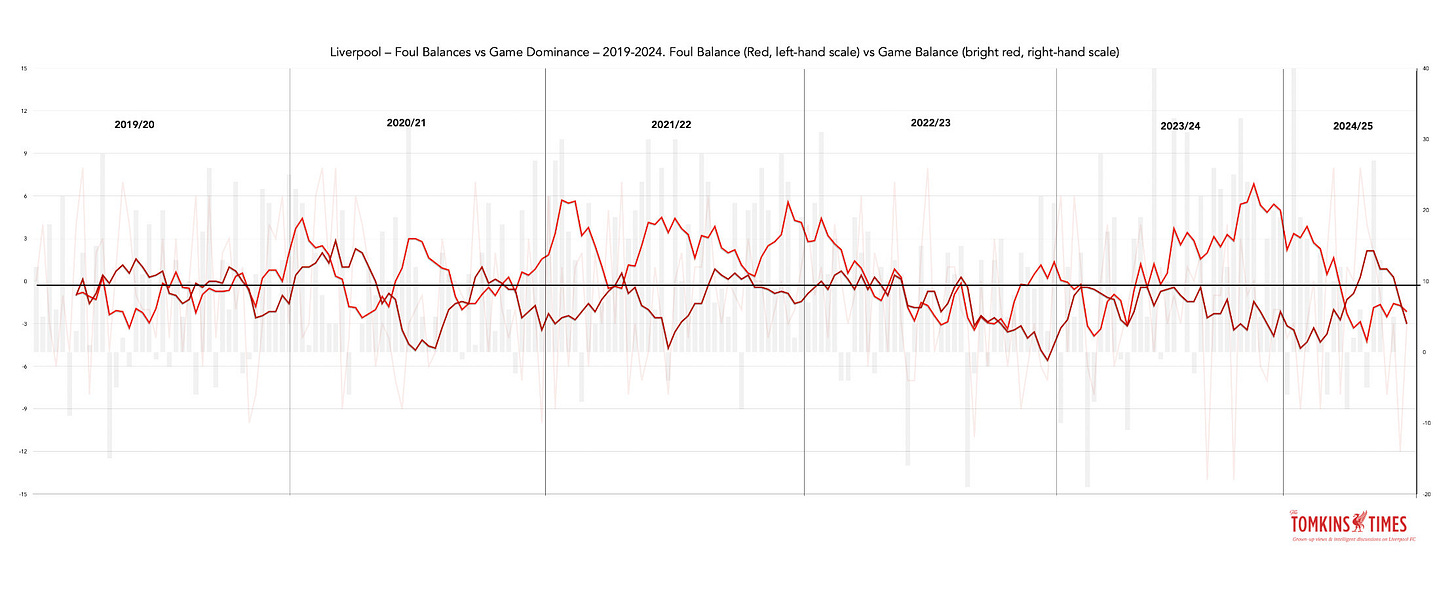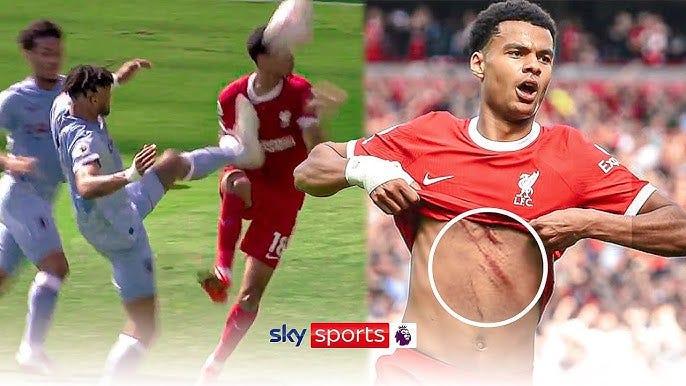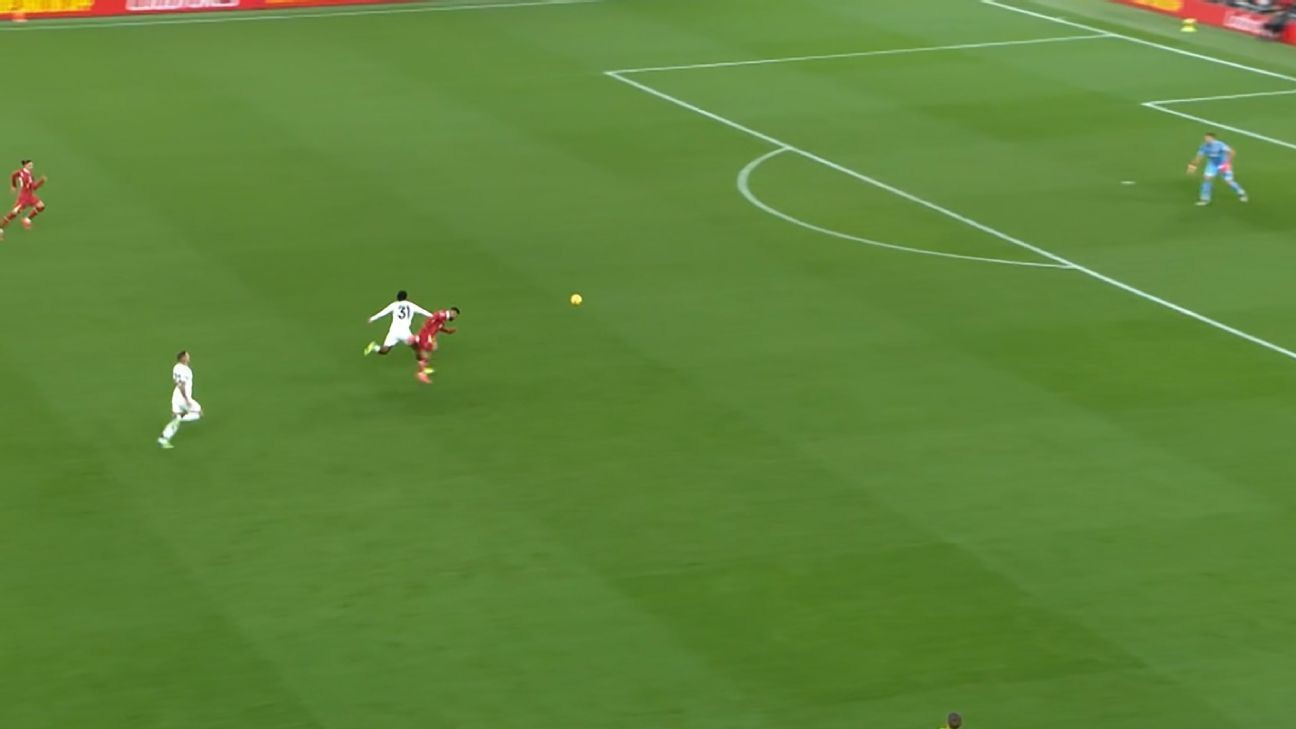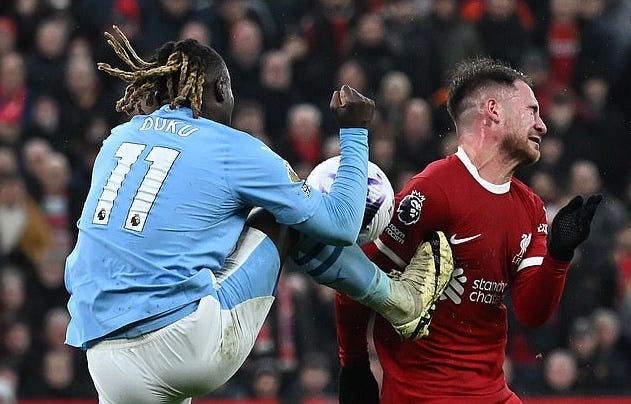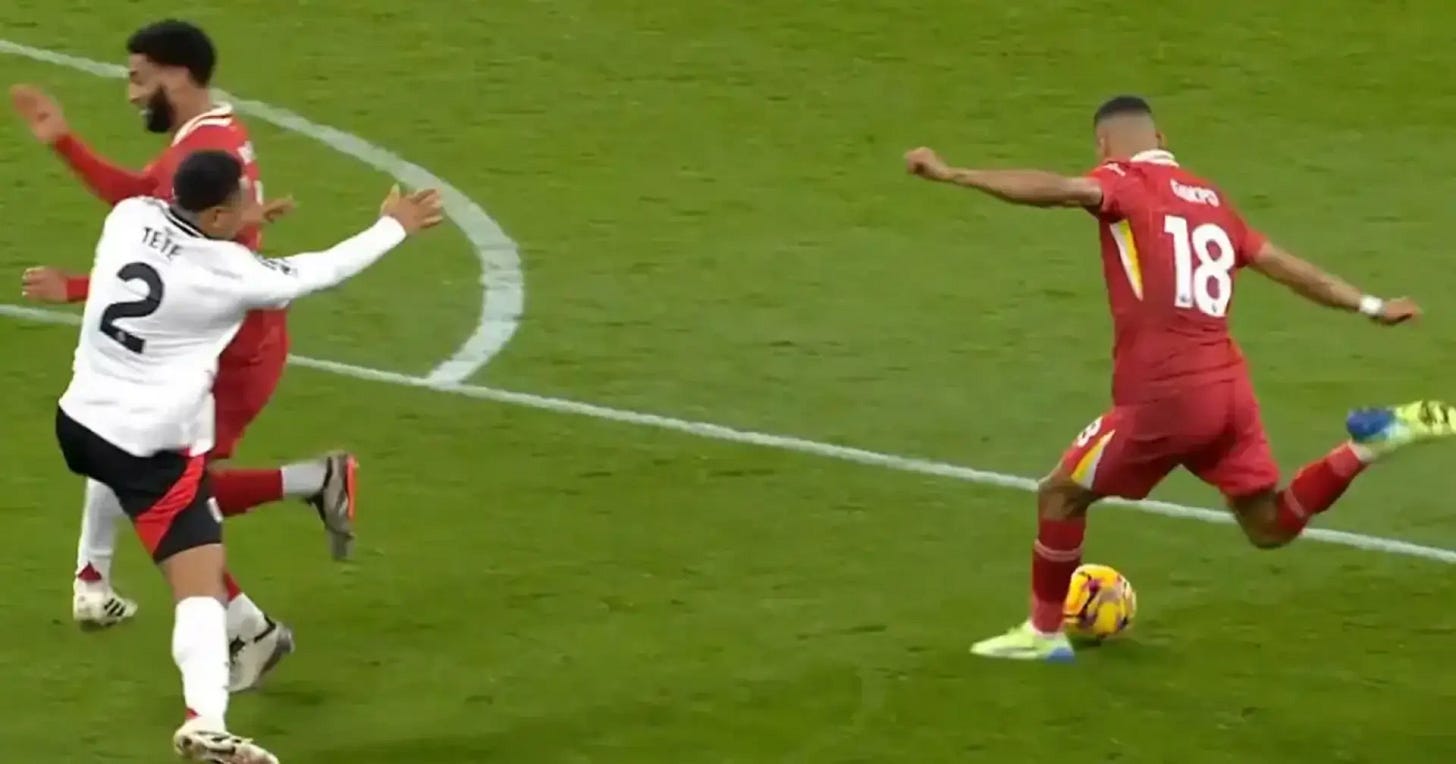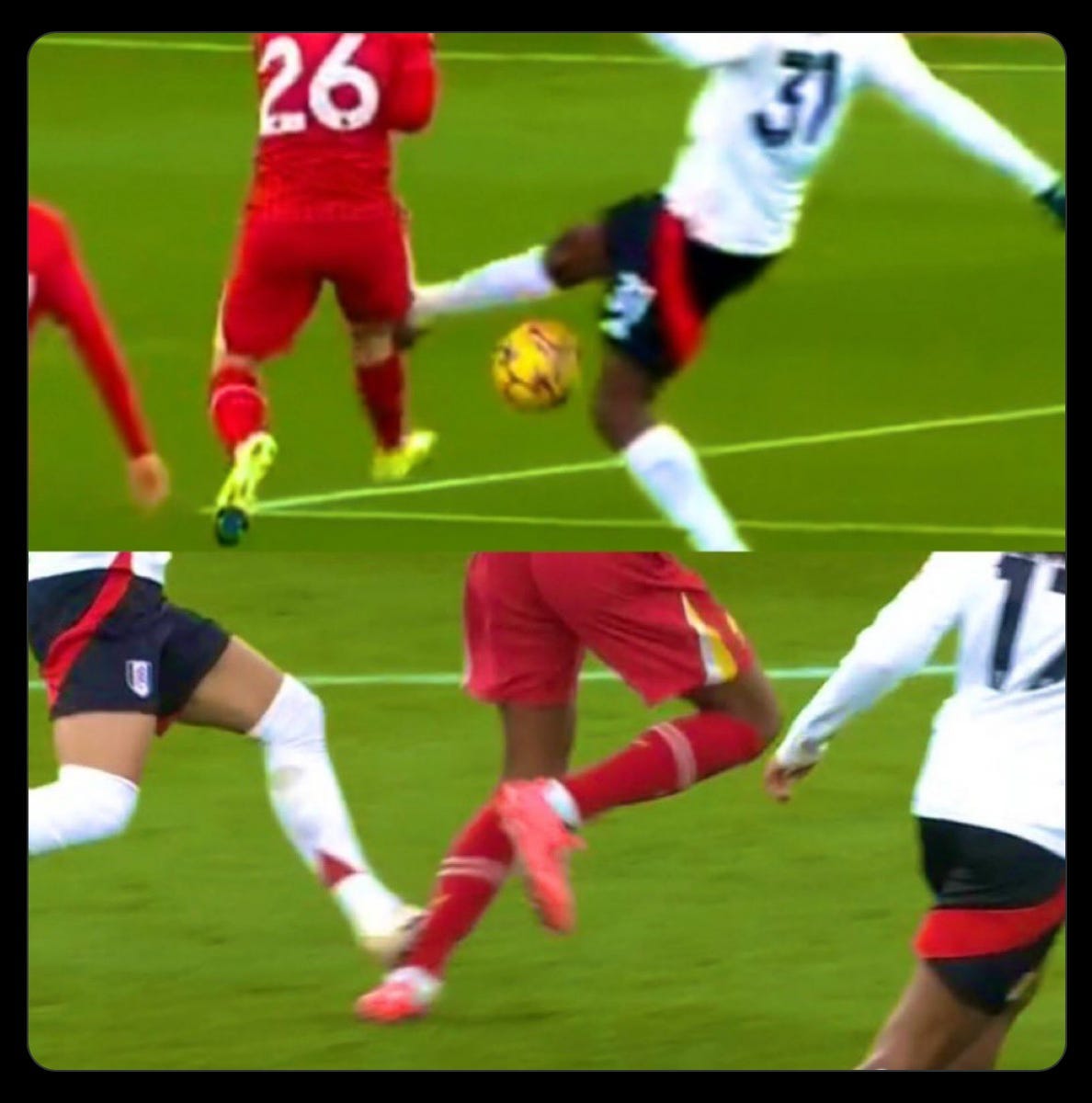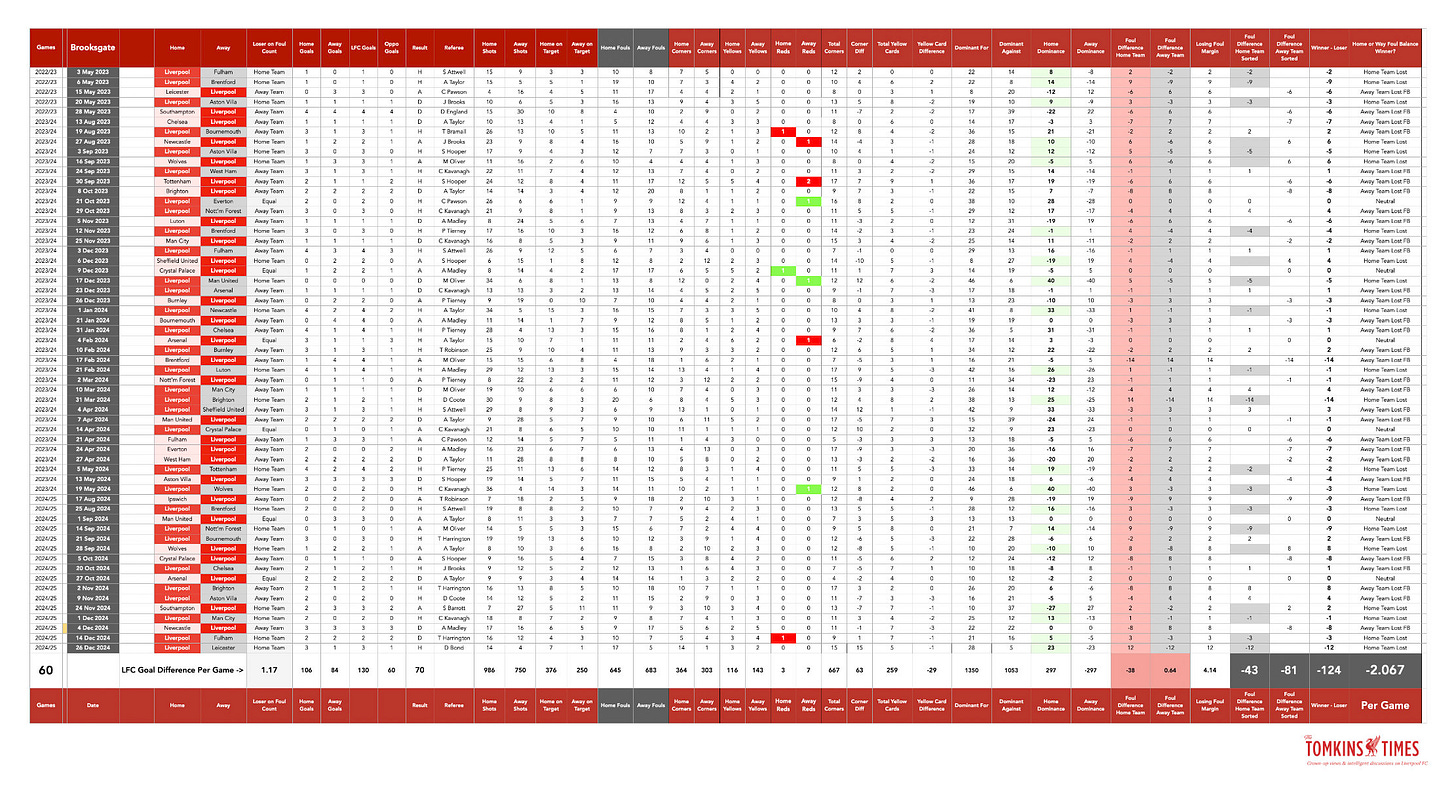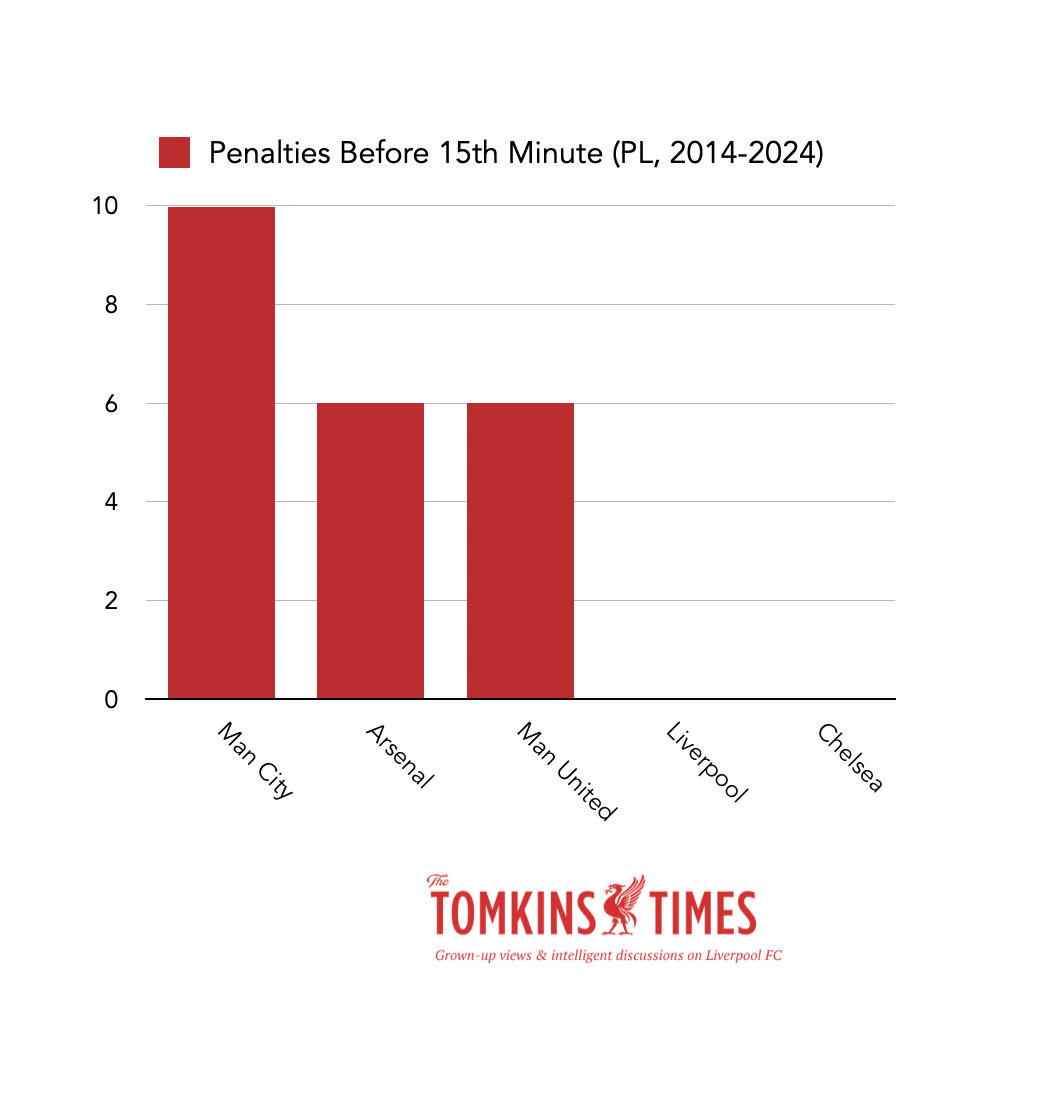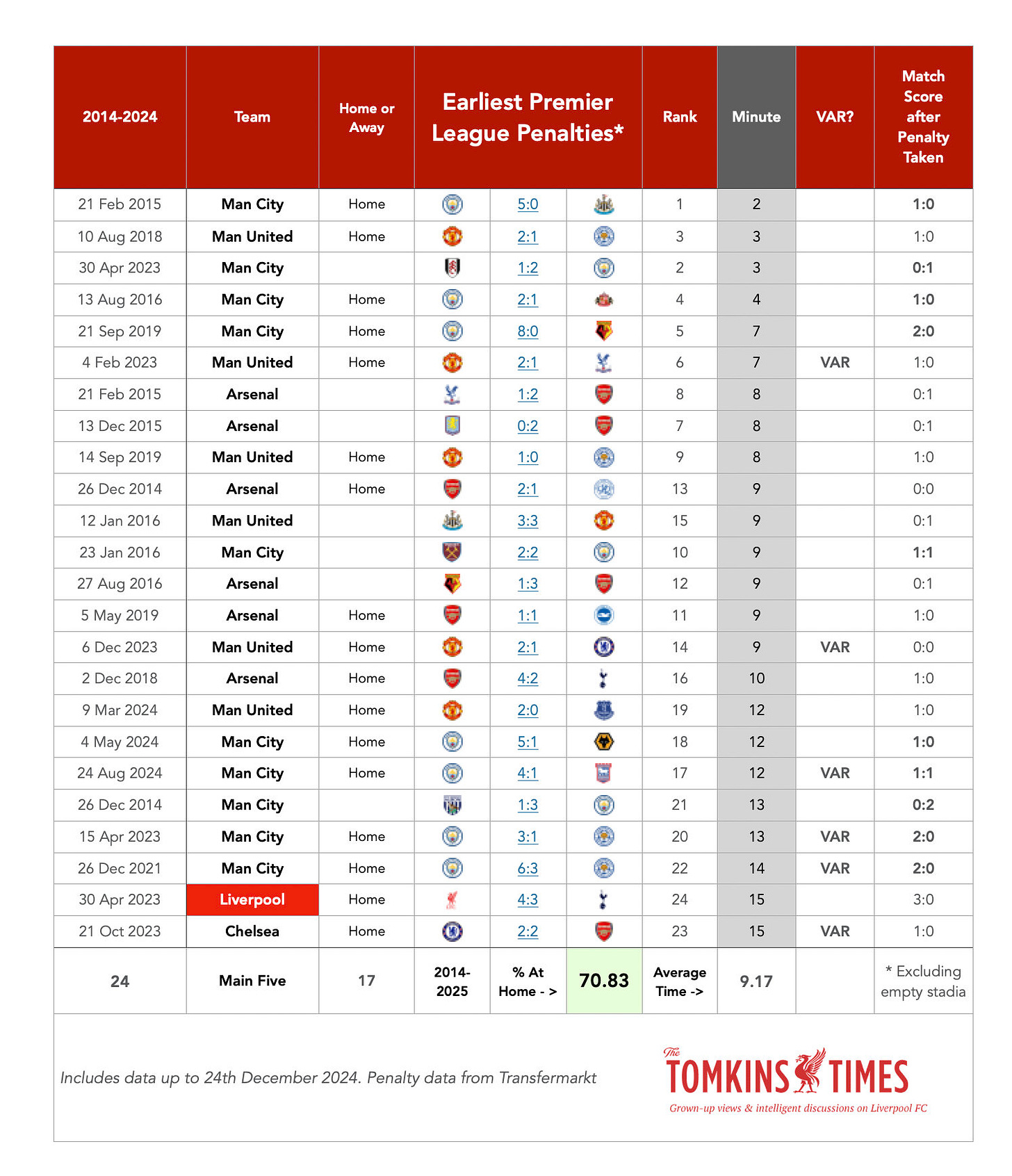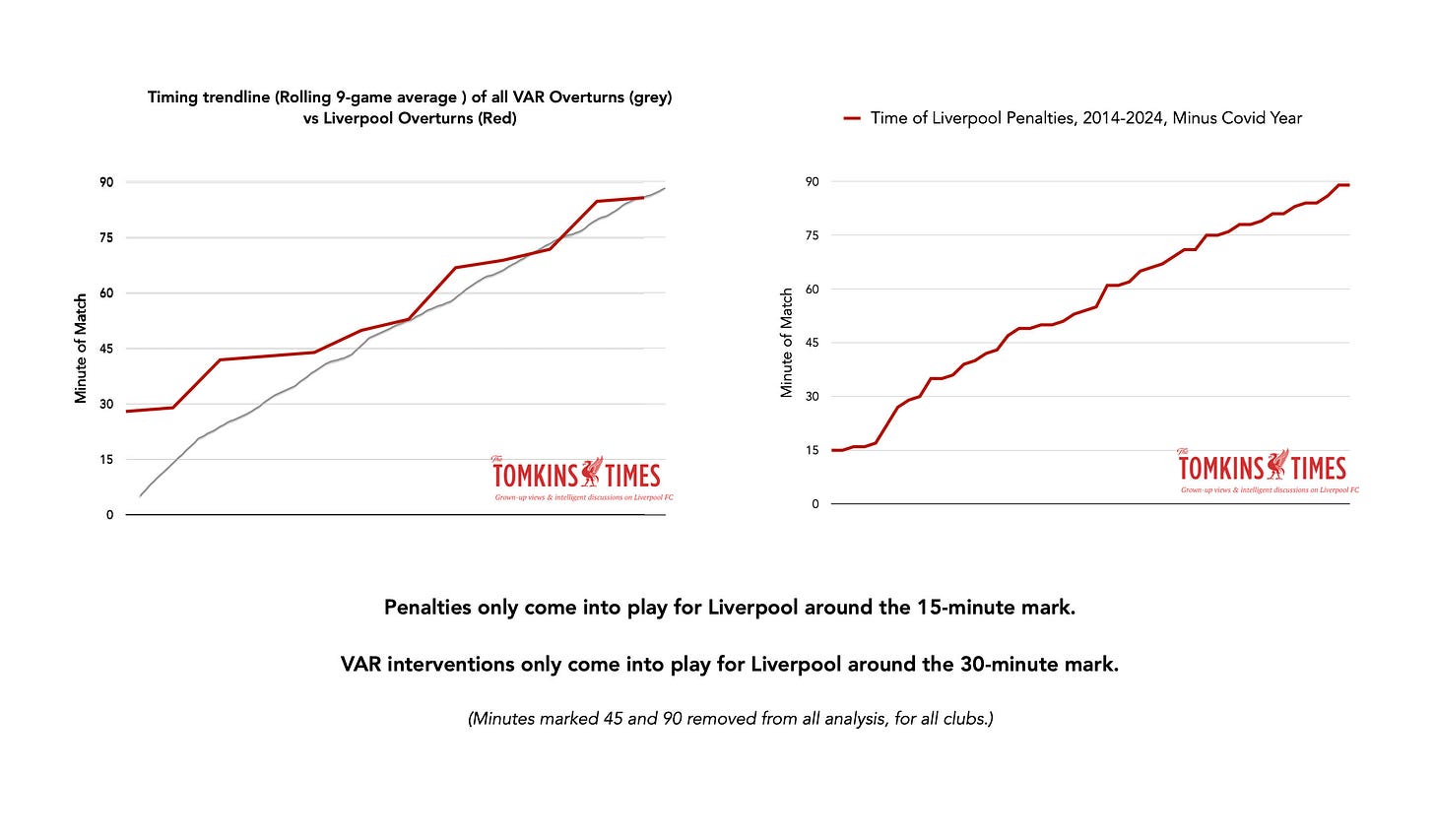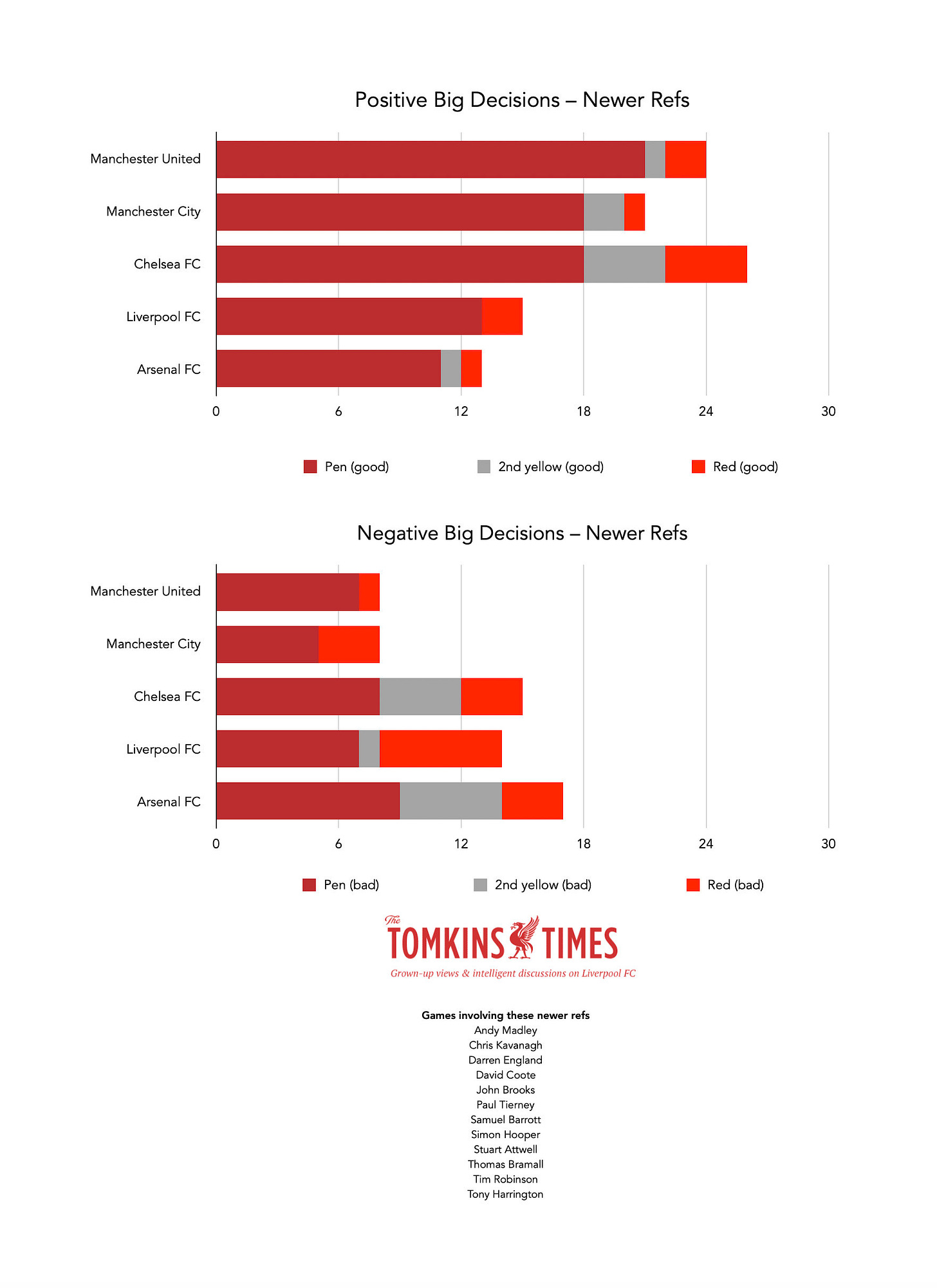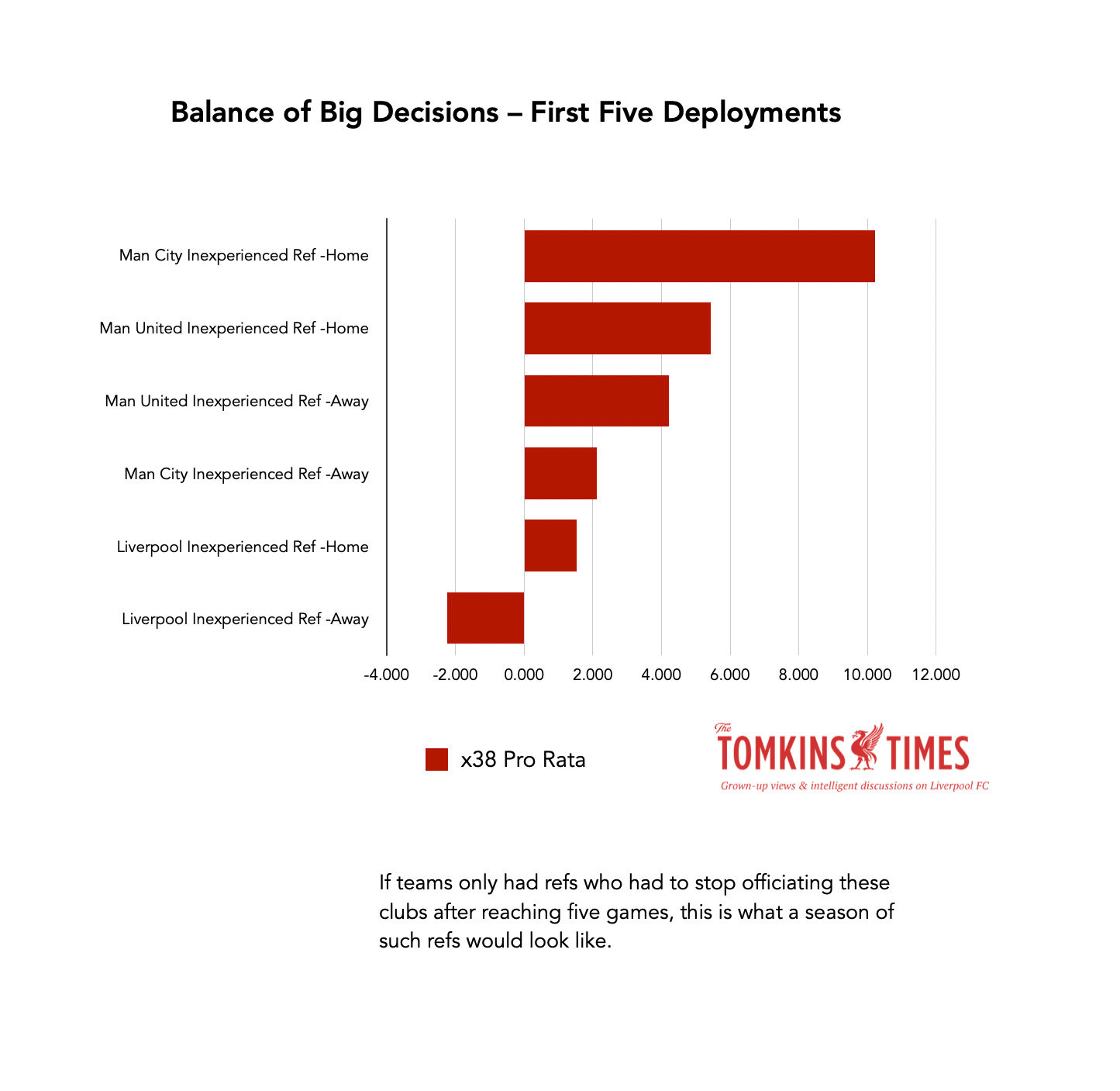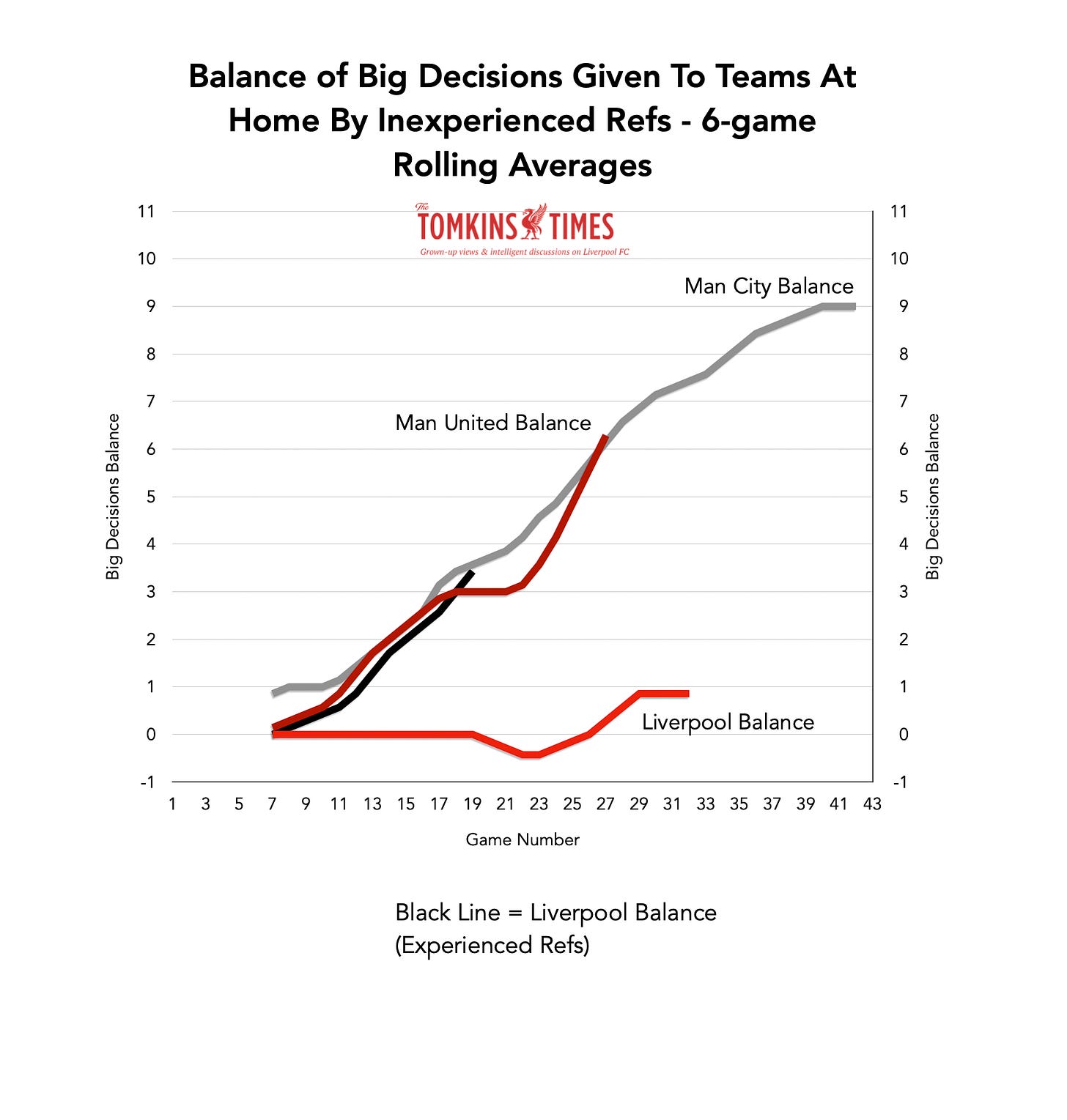44,276 Fouls since 2019. Who Did Refs Punish Most? Yet More PGMOL Madness
2,000+ Premier League games analysed. It doesn't even remotely even itself out, and Liverpool get screwed
Can The PMGOL Explain The Strange Patterns in the Data in 2,000 Premier League Games?
After two more months of studying refereeing data as my will to live ebbs away along with my last head hairs, this time I’m going more granular on foul data: 44,276 fouls in all 2,000+ Premier League games since August 2019, thus the VAR era.
And, some more stuff too. Quite a lot.
What I find is that if I don’t include a lot, ‘neutrals’ (who often dislike Liverpool) say “where’s the evidence?” or pick holes that I could just address myself. When I include the evidence, the caveats, the explainers, then it’s “fuck off! I’m not reading that!”
Every team gets good and bad decisions, big and small, that are given or not given, but this is about how it doesn’t even remotely even out.
This is about data so outlying that, well, you think someone is lying.
These are the officials who will, given their histories, possibly derail Liverpool’s title bid. That’s my fear, and why I’m publishing this today. I was up at 6am, unable to get back to sleep as Stuart Attwell molested my mind.
So, I will compare the Reds to other clubs, some of whom get beneficial refereeing in some areas, less so in others. (Fans of other clubs may find it interesting, before they call me a biased bald twat, to which I say: fair enough.)
But the Reds are ‘losers’ in almost every sense where officiating is concerned.
After yet another PGMOL horror show that I predicted before the game last night, because the data suggested it would (just as the data says to expect Mo Salah to score against Man United), I’m publishing all my most recent findings; ahead of schedule, as I’m just so exasperated. It’s not perfectly formed, but it’s pretty comprehensive.
Please feel free to share this free article, or quotes, graphs and charts. Indeed, please do so!
As well as including some of my other analysis, like VAR overturns and Big Decisions, this goes deep on what I call Foul Balance, or Foul Difference – which amount teams win or lose the Foul Balance by, and if it’s connected to game domination, home and away, new manager, playing style, etc.
For me, while Big Decisions change games, Foul Balance is a referee running the game. It’s slowing it down, or in the case of Stuart Attwell at Spurs, immediately changing his foul-giving approach as soon – and you could see it happen – as the Spurs fans began singing “the referee’s a Scouser!” and “Who’s the Scouser in the blue?!”.
The general anti-Scouse sentiment from rival fans plays into it, I’m sure.
Peter Walton recently wrote in the Times:
“During my time as a Premier League referee we were given tuition to make us aware of risks of this kind [home bias]. One obvious factor is a big partisan crowd. It is a massive challenge for someone who has never experienced 60,000 people screaming at them to give a penalty to go through that for the first time. But that is why referees are developed over a long period, so when it happens, they are ready.”
The data suggests that being ready at Anfield, in front of 60,000 people who can see a clear penalty or red card offence, means waving play-on, it seems.
We’ve since heard Mike Dean say “not in this type of game”, when the ref didn’t give a penalty in the Manchester derby; that “it’s too early” to book someone, as you don’t want to give yourself a problem later; and that it would of course “normally” be a yellow card, but not giving one this time was correct (Liverpool at Spurs last time, Lucas Bergvall again).
Plus, Andy Madley has constantly given Liverpool terrible foul balances since 2022, ever since he was told by his boss, Jon Moss, that Klopp had phoned to request that his referee keep out the way of the Reds’ attacks, as Madley blocked the passing lanes and almost man-marked Roberto Firmino out of games (which Moss mentioned in a recent interview, saying he agreed with Klopp).
Madley duly gave nine freekicks to Everton in the last Mersey derby, and none to Liverpool, until the Toffees took a 1-0 lead just before half-time. Everton were physical, but Liverpool were the only ones penalised.
Before moving on to the main analysis, some of the most baffling incidents in the VAR era, and in brackets, the person who was the VAR.
Gomez booted up in the air in the box vs Fulham the other week (Stuart Attwell)
Sadio Mané’s leg grabbed by Newcastle keeper from behind as he was about to score an open goal (Stuart Attwell)
Jeremy Doku on Alexis Mac Allister, 2023/24 (Stuart Attwell)
Burnley 2021, Jota being absolutely flattened in the penalty box (Stuart Attwell)
Robert Sanchez absolutely poleaxes Luis Díaz with a flying knee to the head (Stuart Attwell)
Andreas Pereira stamp on the back of Gravenberch, before Pereira then scores (Stuart Attwell)
Same game again, Andy Robertson clearly fouls Harry Wilson, but should not have been sent off, by common agreement, as not a DOGSO (Stuart Attwell)
Those are just the ones that stand out.
Even half of them would fill some of the gaping holes in Attwell’s Big Decision data as a VAR for Liverpool games (30+ now). Meanwhile, Paul Tierney gives Liverpool literally nothing subjective as the VAR (ever!), and only gives things against the Reds (three to Manchester clubs, two of them very dodgy, before mentioning his blowing for half-time as a ref, six seconds early, as Sadio Mané went through on goal).
These two officials have VARred a staggering 26% of the Reds’ games since 2019, and given one overturn to Liverpool in over 50 matches (but several against). Then, close to 50 games as a ref. In other words, Tierney and Attwell will do one job or the other in half the games.
That single overturn was Attwell sending off Paul Pogba for a shocking knee-high foul when Liverpool were 5-0 up at Old Trafford, and several other decisions from other officials (such as Coote) have come when the game or the season is ‘finished’.
(Note: a couple of sections later in this article were published a week or two ago behind the paywall. All data refers to the Premier League only.)
There’s a lot covered, so strap in … or log off!
Bullet Points
Anyway, in no particular order, other than when they occur to me as I compile the list (which helps the tl;dr crowd), the data says:
Foul Balance doesn’t appear to be linked to playing style, be it aggressive in midfield or hard pressing, or hapless at the back.
Liverpool have absolutely horrible Foul Balance numbers.
Unlike everyone else, including other high-possession hard-pressing sides, the better Liverpool play, the more the referees punish them.
Man United do very well on some officiating metrics, but not on Foul Balance.
(Random interjection: I’m writing and publishing this in light of the predictable but astonishing lack of a second yellow card, once more, for Lucas Bergvall last night, so apologies for any typos that creep in, as I publish this while the iron is hot.)
Foul Balance is generally better for home teams. But not for Liverpool.
While so terrible as a VAR in Liverpool games, David Coote’s three Premier League games reffing Liverpool all involved shocking decisions, but overlooked could be the -14 Foul Balance for Liverpool at home to Brighton, in his second game, when the Reds were last top of the table under Jürgen Klopp in his final season, was, at the time, a 1-in-2,000 occurrence; the worst home Foul Balance in the dataset. Liverpool made 19 tackles and ‘committed’ 20 fouls; Brighton made 28 tackles and committed just six fouls. Liverpool dominated the possession, shots and xG by a long way. Coote appeared to try and keep Brighton’s early lead intact.
Inexperienced refs, including many of Coote’s peers, are far harsher on Liverpool in terms of Foul Balance, and even worse on Big Decisions. The more experienced a ref, the more logical the general outcomes (in that Liverpool’s data is closer to the norm, if still often not great), including Mancunians Anthony Taylor and more recently, Chris Kavanagh. I’ve had some issues with Kavanagh, but he seems much better these days. Ditto Taylor. I’m not asking for perfection, by the way.
The general data of Paul Tierney and Stuart Attwell (as ref and VAR) are, like how I felt with Coote, red-flag material, and their lack of Big Decisions, in particular as VARs when doing by a staggering quarter of all Liverpool games as the VARs, can be highlighted by how many of the most criticised and controversial mistakes and howlers came with them on VAR duty. Tierney, like Coote and John Brooks, had confrontations with Klopp.
When looking at VAR, Liverpool do well on offsides (totally objective) and handballs (semi-objective), but terrible on everything else.
Man City do well on literally everything, albeit not as well as some other clubs in some areas. They have been the best team in the period, which explains some of that. But as the 2nd-best team in that period, also playing possession and pressing football, Liverpool’s numbers are exceptionally different (in a bad way).
Note: I don’t want to suggest that any other club does not deserve its decisions. Just that it makes zero sense why Liverpool’s are so different.
Liverpool, Arsenal and Chelsea do not get early penalty decisions in matches from referees and VARs; the Manchester clubs both get early VAR overturns and penalties, either from the ref or the VAR. For many, the first 15-30 minutes is a No Good Decision Zone. But not for the Manchester clubs.
Already this season, Arne Slot started with a -9 Foul Balance at Ipswich (99th percentile in rarity, Tim Robinson ref, in his second Liverpool game), and then had an 11-0 deficit at Crystal Palace (Simon Hooper ref, 5th game), which was on course to break all records (with no foul for Liverpool until the second half). There was a big negative balance from Madley, at Newcastle. Then, Darren Bond, in his first Liverpool game on Boxing Day, came right in to ‘replace’ the sacked David Coote and gave -12 (17 fouls against a dominant Liverpool in a 3-1 win in the fog and only five for); a 1-in-600 rarity for a home team. How’s that for your debut?!
Since 2019, Liverpool have never had a Foul Balance better than +8. Yet twelve times they’ve suffered -9 to -14.
Opposition players are never sent off for foul DOGSO’s at Anfield. Only Liverpool players. Equally, refs don’t send off opposition players with straight red cards at Anfield; those have come via the VAR (and there were no second yellows for eight years). Handball penalties at the Kop end tend to have to come via the VAR, too, as have other handballs at Anfield.
Liverpool’s Foul Balance was bad until what I will call BrooksGate*, and then it got much worse. (April 2023, when Jürgen Klopp clashed with 4th official John Brooks, in a game reffed by Paul Tierney, and Klopp was banned for two games. This was shortly after Tierney’s regular linesman elbowed Andy Robertson.) Klopp seems to have said some very disparaging things, in his fury at Mo Salah being fouled twice by Ben Davies and nothing being given (because Mo Salah rarely wins free-kicks), and merited his ban. But what happened next seems to have ‘corrupted’ the officials.
Averaging a poor -0.939 per game (148 games, 2019-2023), the Reds’ Foul Balance rocketed to -2.067 per game (60 games).
This is a worsening of 120.1%, or more than double what it was before. Essentially, from a balance of -1 per game to -2, when better teams and teams with a similar style usually have averages of +1, or +2, or +3 per game.
In the immediate aftermath of BrooksGate, Liverpool’s red card rate also went through the roof, with six in 60 games, and four in the next 15 games, including two from Brooks himself, as well as a VAR overturn against the Reds as VAR; over half of the six were bad or borderline decisions, and one was overturned by the independent panel, but not the VAR on duty (Paul Tierney).
Since Brooksgate, inexperienced refs (1-9 games for the club) have penalised Liverpool at an alarming rate, both in general, and in relation to experienced refs: 43.6% more in terms of negative foul balance, from an already bad -1.714 per game (35 matches) to -2.462 (26 matches). Liverpool’s goal difference, however, was almost identically dominant in both sets of game.
(Note here: most of the data was up to just before Christmas 2024, but some previous analysis I’ve done and will refer to has different time periods; I’ll state that when relevant. I added the Darren Bond game, after Christmas, as it was such an outlying Foul Balance.)
Splitting games into how dominant a team was (a net balance of +15 on shots and corners, thus at least 15 better than the opposition on the day) is deemed Dominant. In these games, Liverpool, unlike other clubs, fare even worse than normal.
Spurs, Newcastle and Aston Villa do incredibly well on Foul Balance. Arsenal do exceptionally well in some contexts, less well in others.
Liverpool essentially play the first 15 minutes without the option of being given a penalty (11 years, except when no crowd in 2021), and the first 30 minutes without the option of being given a subjective VAR overturn (5.5 years).
Liverpool went 305 Premier League games across eight seasons with no opposition second yellow card. Neutrals may see why from the two Spurs games.
Since Ange Postecoglou arrived, Spurs average a super-low PPDA (like Liverpool), which means they press a hell of a lot (passes per defensive action). They also like to have possession. So, a similar style to Liverpool.
Yet Spurs’ Foul Balance under Ange is +3.000 at home (winning the Foul Balance in 70.37% of games) and +2.333 away (winning the Foul Balance in 66.67% of games); at the time, it was 27 games home, 27 away.
Since 2019, Liverpool ‘win’ the Foul Balance just 36% of the time. (For the other better clubs, it’s over 50%. And since these stats, it’s down to 35% of the time.)
A lot of the officiating weirdness happens at the Kop end, with referees giving most of their inexplicable decisions at that end, especially if inexperienced. Peter Walton said refs are trained not to react to 60,000 people screaming for a decision, but that doesn’t mean ignoring clear fouls or handballs; and equally, giving as many Big Decisions to the opposition at that end as possible.
With inexperienced refs unlikely to give Liverpool a Big Decision at Anfield, and even in away games, VAR does not step in for Liverpool for fouls in the opposition box.
Liverpool simply do not get foul penalties via VAR (and very few opposition foul red cards). It’s just two foul penalties via VAR in VAR’s five and a half year existence, compared to Man City’s 10 and Man United’s seven; while Man City have conceded just one foul penalty via the VAR, Liverpool three. Perhaps this is connected to #LiVARpool, and general rival fans’ paranoia that Liverpool get all the decisions, all the time. Many smaller clubs and rubbish teams get a better balance of decisions, from refs and VARs.
Liverpool foul penalties by VAR balance, for and against: -1. Man City’s? +9.
David Coote’s anti-Klopp and “Liverpool were shit”tirade is now said to have occurred after he was 4th official in the 7-2 defeat at Aston Villa. The very next game he was the VAR, and when Jordan Pickford went through Virgil van Dijk like a pickup truck, and later disallowed the onside last-minute winner in the era before lines were drawn. Once you realise that he said those things, full of xenophobic spite (“German cunt” and other such lovely phrases), then went into the VAR booth the very next matchweek with that frame of mind, it changes a lot, doesn’t it?
All three of Manchester United’s first trio of positive overturns via the VAR booth came courtesy of Coote; and three of Manchester City’s first six. He went Manchester-crazy from the VAR booth in those early months.
Coote was brought back in when Liverpool were top of the league last season. Darren ‘Good Process’ England has come back with Liverpool top of the league recently. Paul Tierney literally gives nothing to Liverpool as the VAR, and he’s often brought in for big games. Constantine Hatzidakis, who elbowed Andy Robertson, is snuck back in, in a semifinal. (He has a beard now, so it’s okay.)
For someone who spent nearly over three years working for the Manchester FA, 2013-2016 (but which has been memory-holed, despite recent reports of an “investigation into his time at an unnamed local FA” in 2017), all of Coote’s early VAR calls were to aid Manchester clubs, and all of the Manchester clubs’ earliest VAR calls came from Coote.
*Source for this and all of the analysis that follows: football-data.co.uk for foul data, which also included shot and corner data. Transfermarkt for penalty data and timings, and individual referee’s per-game Big Decision and yellow card data. ESPN and Andrew Beasley for VAR overturns.*
Part Two: Into the Weeds*
(*not a cheap dig at some of the refs.)
This is the more detailed analysis, which includes various graphics.
Note: with the graphics, if they’re hard to read, clicking should enlarge them.
Let’s start with Foul Balance by referee, and note that Anthony Taylor and Michael Oliver tend to do a lot of Big Six clashes, where the games are tighter, as shown in the average goal difference.
Coote and England have massively outlying data but from three games each. But their work as VARs also adds to the sense of distrust around them.
The older referees are all much less harsh on Liverpool, albeit only two are in positive numbers, and one of those (Mike Dean) by +0.10, and Craig Pawson is the only one with ‘fair’ data, and that’s just +0.357.
(The other refs excluded did one or two games each.)
Liverpool’s average goal difference is +222 in the games, their Foul Balance -264.
Foul Balance vs Game Domination
Here’s a busier graph (below), with six game dominance levels, three home, three away, for each club – for the three title contenders in recent seasons.
The other clubs near the top are Aston Villa, Spurs and Newcastle.
Arsenal flit about, mostly above average and above neutral; Man City are always above average and above neutral, and have the most very dominant games; Liverpool are always below average, and only once above neutral.
Man United have two of the lowest outcomes too, albeit their average level of domination was lower, home and away.
Arsenal do better with refs when at their most dominant.
Brighton also qualified as having enough dominant games, particularly at home.
More on Coote
That Brighton match with the 1-in-1,000 Foul Balance was Coote’s second ever Liverpool game as ref.
In his first, he failed to give a clear Kop-end penalty, much to the chagrin of Andy Robertson, who was fouled. Then came the VAR disasters, before he was brought back in 2023; and swiftly missed Martin Ødegaard playing basketball in his own penalty area in early 2024.
The third game as ref, he failed to give an obvious DOGSO red card as he twice signalled “no foul” for the trip on Mo Salah before the ball reached Darwin Núñez. Days later, Coote was drowning in all kinds of seedy accusations, his career circling the drain.
Again, he came in from nowhere, with Liverpool top of the league. “Bring in Coote, he hates the Scousers”, was my guess at the time. Little did I know he’d be so fucking stupid he’d have said as much on video, years earlier.
Or did we all just dream that in our paranoia?! Coote has been fired, ushered away without a word of proper explanation.
He began his career with what I found described as: “Liverpool fans wished for Coote to intervene when the home side opened the scoring, as Divock Origi appeared to be fouled in the build up to the goal.” He disallowed a Liverpool goal in that game at Old Trafford for handball by the scorer (Sadio Mané).
As noted above, All three of Manchester United’s first trio of positive overturns via the VAR booth came courtesy of Coote; and three of Manchester City’s first six. He went Manchester-crazy from the VAR booth in those early months.
So, that’s six of nine.
Six of the first nine VAR overturns the Manchester clubs received were from ex-Manchester FA man, David Emanuel* Coote.
(* May not be his real middle name.)
In his first two games doing Man United as the VAR he gave them their first three overturns, all in October 2019. Three overturns in two games! That’s more prolific than peak Ian Rush.
He gave Man City a penalty in December 2019; their first via VAR, in just his fourth game VARring them. He’d give them their third and sixth overturns, too. Their third, and his second for City, was in February 2020, so still just about six months into the VAR era.
If you don’t mention the fact (as seems memory-holed) that he worked based at the Man City youth team ground, for the Manchester FA, maybe it doesn’t seem fishy.
Here’s another fact for you.
By December 2019, just four months into the VAR era, David Coote had awarded two foul penalties to Manchester clubs (as well as handball penalties, disallowed goals, red cards, etc.).
Now, 210 games into the VAR era (209 for Liverpool as they have a game in hand), Liverpool, from all those 200+ games, with all those VARs, have received how many foul penalties?
Two.
Two foul penalties. One every 100+ games.
David Coote, on his own, between October and December 2019, gave (as overturns) Manchester clubs as many foul penalties as a VAR as Liverpool would get in the 209 games with VARs who included Coote himself 13 times, and Paul Tierney (26) and Stuart Attwell (30).
Handball? Maybe they’ll give those if they’re blatant, albeit Coote avoided the most obvious one of them all. But a penalty for a foul?
No. Because Liverpool players, even when karate-kicked in the chest (Tyrone Mings on Cody Gakpo, Jeremy Doku on Alexis Mac Allister) are not fouled. Mo Salah tripped and grappled and strangled, Diogo Jota being ran right into (at Spurs or vs Burnley), even Joe Gomez booted up in the air. Not fouls. Luis Diaz kneed and smacked in the face by a jumping, out of control goalkeeper, not a foul. Sadio Mané, about to score at Newcastle, and not fouled when the goalkeeper grabbed his leg. The Andreas Pereira stamp on the back of Ryan Gravenberch’s achilles, moments before he scored for Fulham. Most, thanks to Stuart Attwell.
Not a foul.
But this? This is a red card.
So to see a blatant yellow-card foul – late, dangerous and cynical – and expect a second yellow fits with Attwell’s patterns (never sent an opposition player off as a ref in Liverpool games, like so many refs, in what is now 18 league games), and also, the way Liverpool went 305 games over eight years without an opposition player getting a second yellow.
That’s not coincidence.
A couple arrived a year or so ago, but now we’re back to the nonsense again, with Bergvall himself not sent off for a second yellow in the league game, which absolutely baffled Gary Neville, who mocked Mike Dean’s post-hoc, post-sanity explanations.
So anyway, Coote alone, for Manchester clubs, helped them hit that target before 2019 was out. Overall, Manchester City have now won ten; Man United seven.
VAR foul penalties called against Man City? One. VAR foul penalties called against Man United? One.
BrooksGate
I created some timelines, with each game and its data from 2019 to late 2024. This helps show how things changed dramatically after BrooksGate. (I created these a couple of weeks ago.)
The timelines look great on by fairly big iMac screen, but not sure how they’ll look reduced within the 800-pixel Substack page width, or on small devices. But you can click on them for a higher res versions.
The first one is the foul balance for each of the 206 games, with the bar the total, and the line the rolling average.
Where you might be able to spot it all gets worse than ever is immediately after Brooksgate, once I add the season markers, and the red line of despair.
Until then, the run of the rolling average staying negative had been about half a season, and generally, while more below the line than above, there’s the run from BrooksGate that meant Jürgen Klopp’s Reds were never in a positive balance (rolling average) for his entire final season, and into Arne Slot’s campaign: almost 18 months, or 54 games. Almost a season and a half.
As noted, the Reds were averaging a poor -0.939 per game (148 games), then it rocketed to -2.067 per game (60 games).
And right now, after a brief peak, the balance is back in the negative again.
So, what about the main rivals, Man City?
Incredibly, albeit perhaps coincidentally (but there are a hell of a lot of coincidences), Man City’s foul difference (turquoise line) rises to its highest positive balance from virtually the day of BrooksGate, and 20 months later, has yet to fall below it.
It almost did as they fell apart this season; but still didn’t.
Just as they dip when playing terribly, Liverpool dip again, when playing brilliantly.
Man City, previously high and hard pressers, stopped pressing as much in 2022, with the arrival or Erling Haaland. Their PPDA (passes per defensive action, the proxy for pressing) rises above 10, which means less intense. But for a season, foul count remains constant.
If the reduction in pressing was the key to a better Foul Balance, this would show in 2022/23. Equally, they weren’t massively penalised before 2022 either, except when struggling in 2019/20.
Indeed, when I looked at all the teams with a low PPDA (low=intense pressing), Liverpool were the only ones to concede a high foul differential. That included Man City at their most intense as pressers.
So, what about Spurs?
Since the arrival of Postecoglou (shortly after BrooksGate, which was against Spurs), no one has averaged a lower PPDA, at almost record levels, and not being famous for sound and steady defending. But no, here’s theirs compared with Liverpool’s Foul Balance.
I don’t think either Spurs or Liverpool are ‘dirty’ teams. Not many teams are now, albeit some are more cynical, and proud of it.
When Arsenal were going for the title twice in a row, they still conceded fewer fouls compared to opponents than Liverpool.
Arsenal now are struggling on Foul Balance, but they have become a team that sets out to disrupt and foul, it seems, and had a few sendings off this season.
Like Newcastle, Arsenal are seen by many neutrals as relative masters of the dark arts, having taken lessons from the main Master, Diego Simeone. Both clubs press hard under their current managers.
Newcastle’s foul balance was excellent in mid-2021 (under Steve Bruce), and was from 2022 to 2024.
Interestingly, Newcastle also have the best balance of subjective VAR overturns since its introduction in 2019, and almost all of them have come since 2021.
Next, just look at the number of times the Reds have been below the line (negative Foul Balance), compared to above, when listed in descending/ascending order.
It’s 115 times; and 134 where the Reds have not had the advantage.
That’s 55.3% of games losing the Foul Balance, and 64.4% of games when losing it or equal.
‘Winning’ the Foul Balance occurs just 35.6% of the time, or essentially just one third.
Dominance
When comparing the Foul Balance to dominance, Liverpool have six clear periods of very positive match domination and very negative Foul Balances. The Reds’ most attacking, dominant football was in 2021/22 and 2023/24.
BrooksGate Events
This, below, was in Brooks’ first game as a ref in a Liverpool game, after BrooksGate. He gave Aston Villa an early Kop-end penalty, but when this happened at the Kop end? Nada.
Of course he wasn’t going to give a red card.
It’s about 1-2 feet higher than the one Sadio Mané was sent off for at Man City, and Mané didn’t see Ederson arriving outside his box.
But Brooks did dismiss Virgil van Dijk early next season (and very early in a game), as the other officials seemed to rally around him, and sent off four Reds in the early weeks.
Brooks also gave Palace a penalty as the VAR a few months later. Until Klopp was gone, Brooks was only going to punish the Reds, it seemed. That’s what the data says.
And again, all post-BrooksGate:
Coote, Coote, Attwell, Attwell, Attwell, Attwell.
England.
England, who purposefully found a still that distorted what actually happened.
And this, below, is how Liverpool slipped from just under -1 Foul Balance per game to -2.067, despite late 2022/23 to Christmas 2024 being a really dominant period for Liverpool’s football.
Since BrooksGate, inexperienced refs (1-9 games for the club) have penalised Liverpool at an alarming rate, both in general, and in relation to experienced refs: 43.6% more in terms of negative foul balance, from an already bad -1.714 per game (35 matches) to -2.462 (26 matches), to form the average of -2.067 when mixed with the more experienced refs.
Liverpool’s goal difference, however, was almost identically dominant in both sets of game.
The average from 2019 up to BrooksGate was -0.939 per game.
Refs doing between their 1st and 7th Liverpool game gave three penalties against Liverpool, and sent four Liverpool players off (albeit there was one more, Curtis Jones, but that was a VAR call).
The same set of very inexperienced refs gave three penalties to Liverpool, and sent one opposition player off. Better, dominant teams can usually expect 2:1 ratios in their favour on Big Decisions.
Six Big Decisions against Liverpool in the post-BrooksGate era, the average number of times the officials had reffed Liverpool matches averaged just 2.5, including Brooks in his 2nd game (penalty to Aston Villa, Kop end, but where he didn’t send off Tyrone Mings, Kop end), and in his 3rd game (DOGSO against Virgil van Dijk).
And the Kop end really messes with refs’ heads; again, as if they’re trained to be strong to the point of wilfully unhelpful.
Two other Big Decisions were by VAR. That left Samuel Barrott in his first game – a foul by Andy Robertson, but given inside the box when it was hard to tell; Simon Hooper, 5th game, sending off Diogo Jota at Spurs for two yellows, despite Curtis Jones having been sent off (and knowing of the offside cockup), that weren’t even fouls; Tony Harrington in game three, when Robertson again made the foul (Kop end), but again it was a bad decision on the DOGSO; Thomas Bramall, first game, Kop end, sending off Alexis Mac Allister, which was ludicrous, and overturned not by Tierney but the panel. (Curtis Jones was sent off due to the VAR’s decision – Darren England.)
For decisions given to Liverpool, the average number of games the officials had reffed Liverpool was 10.14, or more than four times the number of matches.
Two of the highest recorded negative foul balances by any ref in any Premier League game (2,056) were the -14 of David Coote in his second Liverpool game, and -12, of Darren Bond, in his first. As noted in another section, these are 99th percentile occurrences, 1-in-600 to 1-in-1,000.
Tim Robinson also reffed his second Liverpool game with a -9 foul balance against the Reds away at Ipswich in Arne Slot’s first game, when Ipswich were the more physical side.
Coote also failed to send of Leon Bailey on a Kop-end DOGSO, and failed to give the Reds a clear Kop-end penalty in his first game at Anfield, in 2020.
Other Kop-end mistakes by these refs include Tony Harrington sending off Andy Robertson and Thomas Bramall incorrectly sending off Alexis Mac Allister.
John Brooks failed to send off Tyrone Mings at the Kop end, where he’d earlier given Aston Villa a (correct) penalty.
In Brooks’ third game reffing Liverpool he sent of Virgil van Dijk at Newcastle for an early DOGSO. In his fourth, after Klopp was gone, he gave Liverpool two penalties against Chelsea, albeit one was overturned.
Following BrooksGate, in the space of eight months up to the end of 2023, Brooks sent off a Liverpool player, and gave two penalties against the Reds (one as ref, one as VAR); whilst not sending off Mings.
In that time he gave nothing to Liverpool … until Klopp was gone. Maybe now he’ll be trustworthy?
Early Punishment For Liverpool
“Too early” said Mike Dean, on the yellow card that could have been given in a recent game; you don’t want to make a problem for yourself.
“Too early” seems to be another bit of leakages from Dean, chief leaker of the truths of refereeing to narratives, not what actually happens.
I decided to find my old penalty database and update it, as well as some VAR overturn spreadsheets.
Going back ten years, I found that 90.3% of Liverpool’s penalties are awarded in the final 75% of the match.
Therefore:
Only 9.7% arrive for the Reds in the first 25% of matches.
Excluding empty stadia, it falls from 72 penalties to 66.
Then, just 7.6% arrive for the Reds in the first 25% of matches with crowds.
Liverpool’s three earliest game-time Anfield penalties came at the Anfield Road end. (Just as the two recent sendings off to Liverpool players have been at the Kop end, as if to prove a point; both were mistakes. Penalise Liverpool at the Kop end seems a theme.)
No Kop-end penalty has been given before 17 minutes, and that 17th minute one was back in 2015, 10 years ago on New Year’s Day, so virtually to the day.
(Weirdly, I was there, and wrote about it for a book by Sachin Nakrani, “We’re Everywhere, Us”, where writers submitted a chapter on a game in the 2014/15 season. Liverpool got two penalties that game, in a 2-2 draw with Leicester.)
Since the arrival of Jürgen Klopp in 2015, the earliest Kop-end penalty in the Premier League is 23 minutes, or a quarter of the way into the match.
But how does all this compare to other clubs?
In total, from 2014-2024, 22 Premier League penalties were awarded to the other Main Five teams at a time earlier than Liverpool’s first.
Also, earlier penalties are more likely to be at home than penalties in general: 71% compared to 61%.
That Liverpool received an Anfield penalty after four minutes and and away one after 13 minutes in the season of no fans, 2020/21, adds to the idea that, given that they are the two earliest received (out of over 60 home and away), refs are far too aware of fans when it comes to Liverpool. Man United also got two penalties after two minutes in the empty stadia, but they also get them in full stadia.
Also, Liverpool were already 2-0 up when their first penalty appears after 15 minutes, meaning the game was already not close, and the penalty was not given during a knife-edge game-state. You have to go to 25 minutes before another team was given a penalty when already two goals to the good, and thus when the stakes were lower.
Since 2014, and again excluding the pandemic year, Liverpool received just three away penalties before the 40th minute of matches.
Exactly half of the era covered was VAR. Several of Liverpool’s penalties at Anfield (and at the Kop end) were not given by the referee on the pitch.
Of all the penalties in my database (which isn’t every team), 53 were given as timed at 45 or 90 (when 45 could include another ten minutes, the same with 90), so to see the average time of penalties, these needed to be removed, as I’d done with VAR overturns.
It falls to 51.02 from 54.15.
Doing the same for VAR interventions for all clubs and all subjective decisions (300+), the average is 50.65, so virtually identical, dropping from 54.69. (54 VAR calls fell on minutes 45 or 90.) So there is a huge consistency here.
Yet Liverpool’s average time of Big Decisions and VAR overturns received is later than that of the other clubs.
(Some double-counting is included in that penalties may have been awarded by the VARs.)
Nine penalty overturns were awarded to the Main Five by VARs within the first 15 minutes.
Two of these were in lockdown, and so don’t appear on the table, as those were removed due to the difference in circumstances. One was a penalty being overturned, 7 May 2023, with Newcastle’s spot-kick against Arsenal cancelled.
So, of the 24 penalties given in the first 15 minutes of matches, six were by the VAR.
The three awarded by VARs before the 10th minute were to:
Manchester United, by Tony Harrington, 4th minute;
Manchester United, by David Coote, 6th minute;
Manchester City by David Coote, 9th minute.
(As I said, lots of coincidences around Coote.)
Below is a list of all Premier League penalties awarded before the 15th minute, excluding the season of closed stadia.
Well, that’s pretty clear, isn’t it?!
It’s all starting to feel a bit more than a coincidence, isn’t it? Or am I still being paranoid? (Always a possibility!)
Refs and VARs definitely give fewer big calls early in games in general, but Liverpool are given fewer still.
These are the earliest penalties given to the Main Five, minus the Covid season. (Remember, plenty of other teams also got earlier penalties.)
Paul Tierney, in fairness, awarded the Reds’ earliest, in his first game after his erstwhile assistant elbowed Andy Robertson. (Guilty conscience?!)
That assistant, Hatzidakis, had chalked off a late Liverpool winner at the Kop end in Tierney’s first game, in 2017, when the ball may have gone in off Dominic Solanke’s hand, at a time when accidental handball was fine. Hatzidakis was back on duty in Liverpool games last night.
These are the earliest VAR overturns given to the Main Five, minus the Covid season. (Remember, plenty of other teams also got earlier VAR overturns.)
Arsenal and Chelsea no longer seem to get early penalty decisions either, but they used to. They do get some early VAR decisions.
Crazy, huh!?
Liverpool essentially play the first 15 minutes without the option of being given a penalty (11 years), and the first 30 minutes without the option of being given a subjective VAR overturn (5.5 years).
(Grey line is the general trendline for all clubs.)
Liverpool obviously get early offside VAR calls, as offsides, in more recent seasons, are clearly objective, with proper lines now. (Less so when Coote chose to overrule the 2019 Goodison derby winner.)
Overall, there have been 13 subjective VAR calls For Liverpool, and 14 Against – if you include where the VAR’s call was incorrect on a red card (Tierney on the Mac Allister red). The Against number also includes Lee Mason telling Andre Marriner to review a non-foul by Fabinho, which he did, and saw no foul.
Ref’s were 42.86 new, and the rest (57.14) were older refs
VARs were 66.50 new, and the rest (33.50) were older VARs
So Liverpool tended to have two-thirds of refs being experienced/older, and two-thirds of VARs be newer or younger (graduating 2015 onwards).
Stuart Attwell and Paul Tierney have been VAR for 40.6% of the games done by new refs (54 of 133) and 26.6% of ALL Liverpool games.
In that time, their overturns have been one for, five against.
Good process, lads!
It’s not like there were loads they could have given.
Oh, wait…
Inexperienced Refs
This data is based on the same 12 inexperienced referees. I’ve touched on inexperienced refs already, but they really are a problem. These are not just the really recent batch.
In this case, it’s 12 who have first reffed Liverpool since 2015, or in Stuart Attwell’s case, since being promoted again, having been demoted for giving a goal in a Reading game in 2009 when the ball went out for a corner.
Andy Madley, Paul Tierney, Tim Robinson, Chris Kavanagh, Samuel Barrott, Tony Harrington, Darren England, Simon Hooper, David Coote, Stuart Attwell, John Brooks and Thomas Bramall (Darren Bond hadn’t done a Liverpool game until after I did this part of the analysis). All of these became Premier League regulars in the ‘Klopp era’.
Arsenal seem particularly hard done by here; even worse than Liverpool, albeit over the full 5.5 years, Liverpool have been the better team.
But the key thing is, looking at the same refs before they move from inexperienced (1-9 games) to experienced, they only really start to give a positive balance of Big Decisions (which should be close to 2:1 for the best teams) for Liverpool once past the 10-game mark.
In each of the newer 12 refs’ first five deployments (and now you could add Darren Bond’s one game, no Big Decisions), the Reds are hammered away from home and struggle to get much more than a positive balance of +1 at home.
The data suggests that the inexperienced refs rush to give the Manchester clubs Big Decisions in their first deployments. They give more than usual; to Liverpool, less than usual.
Below is a Balance of Big Decisions at home, which trends towards +9 for the Manchester clubs around the 43-game mark. City have indeed had that many games with these refs.
Liverpool’s average, however, trends towards +1, but only after being zero for 20 games, then below zero for a series of games.
However, if you look at the black line, this is the Reds’ balance of Big Decisions at home with games 1-9 (so going back further to the late 2000s/early 2010s) by Anthony Taylor, Michael Oliver, Kevin Friend and Andre Marriner.
(It’s the home games that were in their first nine games overall for the club, so around 4-6 each).
As all of these trends match up, including the black line, it suggests that the outlier is the inexperienced refs in the Klopp/post-Klopp era.
Too Much!
I’ve got more, much more, but it’s already too much.
I genuinely don’t want to keep doing this, but I seem to be the only person with all the data and a modicum of curiosity.
But I can’t stand by and watch Arne Slot’s superb side (with elite underlying numbers) being sideswiped by the PGMOL, having dropped two points against Fulham and now lost a League Cup semifinal in recent weeks to terrible officiating; and having four or five games with truly crazy Foul Balances.
You can see that it’s already getting to him, a calm man, as it did with Klopp, a far less calm man, who grew increasingly bewildered.
The data is clear.
However, I’m sorry if I can’t present it in a form that’s as clear to readers as it is to me, with myriad charts, tables, graphs and other spreadsheet info that I know all the details of, and which spin around my brain, but can’t distil into one article, or even a series.
I’ve tracked this stuff with increasing detail for years now. Liverpool are getting a fairer balance of penalties lately, but the opposition red cards (both straight red and second yellow) have fallen away despite clear incidents, and the Foul Balance is truly horrifying and outlying, meaning refs are ‘controlling’ games in a manner that harms Liverpool. And still no foul penalties from VARs for the 5-10 the refs have missed or ignored.
I expected positive change and reform after the Coote disgrace, given his hatred of Liverpool FC, but instead we have Darren England back, Constantine Hatzidakis back, just as we had Coote back, right at pivotal moments. Top of the league games, cup semifinals.
I don’t know who at the PGMOL selects refs and VARs for particular games, but I’m sick of the ‘coincidences’, as well as the subsequent cockups.
I thought Tony Harrington reffed his first two Liverpool games really well, but then gave the Robertson DOGSO early against Fulham.
Sam Barrott handled his two games well, but chose to give a foul by Andy Robertson as a penalty; all borderline calls like this seem to go against Liverpool, never for Liverpool. He did give a clear handball penalty to Liverpool in the same game at Southampton. He seems a good ref, as does Harrington, but they’ve gone in early with borderline calls against the Reds.
My issue in the past was that it was the same old refs: Tierney, Attwell, Kavanagh, often acting as the VARs if not reffing.
But the newer bunch, unlike in the past, seem trained to not give Liverpool decisions at Anfield, so as to prove their mettle. They seem trained to be afraid of the atmosphere and the Kop, and to take any cry for a decision as a chance to show how strong they are. They turn up like Barcelona did in 2019, expecting a hard time.
Michael Oliver has also stopped giving Liverpool Big Decisions, as ref and VAR, having been almost the only one who did so for a few years.
I’m not sure if it was Oliver or Attwell who said “they both come in high”, as Mac Allister, feet on the ground, tries to chest the ball, while Doku studs him in the nipples.
Anthony Taylor will give Liverpool Big Decisions. Finally, Tierney started to, but only as a ref; never, ever as a VAR.
Kavanagh seems to be pretty decent after a bad first few years, getting plenty wrong but enough right. His low point was, with Tierney, not giving Everton the clear handball against Man City for which Everton (but not Liverpool) received an apology, as if the title race wasn’t worthy of a mention. Kavanagh was also poor for the game at Spurs in 2021, where all the officials seem to be poor when the Reds visit.
Craig Pawson? He’s the fairest to Liverpool (fractionally more fouls to Liverpool than against, and a reasonable, ‘fair’ Big Decision record), but rarely gets assigned. Instead they send the hapless middle-aged Darren Bond, another Lancastrian, who seems to have been dragged out of a 1980s’ nightclub. Let’s not be ageist, but running around aged 45-56, as many of these officials are or have been, is not that easy, while eyesight and reaction times dim.
In this time, Liverpool will have had lucky decisions, too. Ibrahima Konaté could have had a second yellow against Everton.
There will be others, but the data shows it mostly only goes one way.
We can all find incidents to suit our narratives, but this is about the preponderance of the evidence.
And me? It’s time to publish and be damned, and wash my brain out with carbolic soap and disinfectant.
Postscript: These were some VAR-era incidents crowd-sourced on TTT, plus some clear DOGSO’s at Anfield going back further. PB= post-BrooksGate. There may have been others!
1. Salah fouled in box at Villa Park 7-2, 2019/20
2. Gomez fouled the other week vs Fulham (Stuart Attwell VAR) (PB)
3. Mané’s leg grabbed by Newcastle keeper (Stuart Attwell VAR)
4. Jota clotheslined at Spurs in late 2021 (Tierney ref, Kavanagh VAR)
5. Doku on Mac Allister, 2023/24 (PB) (Stuart Attwell VAR)
6. Robertson vs Burnley (Coote ref)
7. Mané at Sheffield United, 2019 (Coote VAR)
8. Matip headlocked vs Newcastle
9. Burnley 2021, Jota being absolutely flattened in the penalty box
10. Martin Odergaard handball (PB) (Coote VAR)
11. Dea Gea / VvD “foul” (Tierney VAR overturn)
12. Bailey on Phillips Old Trafford 2021, crazy overturn by Tierney
13. Foul on Origi at Old Trafford in 2019, VAR Coote
14. Coote VAR in the derby. Jordan Henderson’s winner disallowed.
15. Harry Kane studs up, late on Andy Robertson (Tierney ref, Kavanagh VAR)
16. Tyrone Mings’ karate kick on Cody Gakpo (PB). Brooks ref (Stuart Attwell VAR)
17. Robert Sanchez smashing Luis Díaz in the face (Stuart Attwell VAR)
18. Pereira stamp on the back of Gravenberch (PB) (Stuart Attwell VAR)
19. Pickford on van Dijk (Coote)
20. Mac Allister red card not overturned (Paul Tierney) (PB)
21. Adam Lallana on Ryan Gravenberch (PB) (Michael Oliver VAR)
22. Curtis Jones red at Spurs when he makes contact with side of the ball before his foot rolls over it (PB) (Darren England VAR)
23. Diogo Jota two unfair bookings at Spurs (PB), Simon Hooper ref.
24. Mo Salah recently vs Aston Villa 2024 (Coote crosses arms twice to say no foul, Darwin scores) (PB) (Tierney VAR)
25. Mo Salah kicked by Lascelles late on vs Newcastle as a DOGSO (2018)
26. Diogo Jota vs Chelsea, Tosin as a DOGSO (PB)
27. Mané fouled by Maguire of Leicester as a DOGSO (pre-VAR)
28. Robertson incorrectly sent off for DOGSO (Stuart Attwell VAR)
29. Robertson elbowed by the linesman! I mean, WTF?!
Keep reading with a 7-day free trial
Subscribe to The Tomkins Times - Main Hub to keep reading this post and get 7 days of free access to the full post archives.


